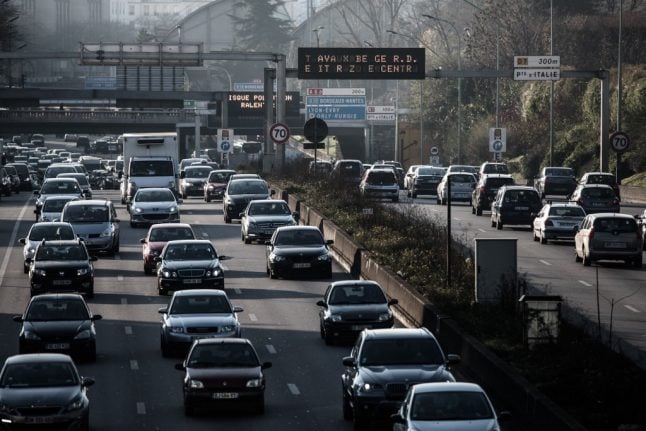The mother and the daughter are asking for €160,000 in damages from the state at the administrative court of Montreuil in the east of Paris.
They argue the authorities did not take effective measures against atmospheric pollution, in particular during the very high pollution that Paris endured in December 2016.
READ ALSO
- Could Paris' famously traffic-clogged ring road become a park?
- The €72 million plan to create the 'largest garden in Paris' around the Eiffel Tower
- What are the 10 towns with the worst air pollution in France?

Smog over Paris. Photo: AFP
The pair say this had an effect on their health, especially as they were living at the time in the northern Paris suburb of Saint-Ouen, just outside the clogged péripherique ring road.
The péripherique – opened in 1973 – takes 1.1 million drivers a day but is also a nightmare for the 100,000 people living around it due the high levels of pollution generated by the – frequently stationary – traffic.
Both say they developed respiratory problems that were accentuated during pollution peaks. The mother, 52, has had to take time off work and the daughter, 16, suffered asthma crises.
They have since moved to the city of Orleans on doctors' advice and their health has improved considerably, says lawyer Francois Lafforgue.
Their legal team argues that French authorities failed to implement rules to better protect the population, did not use all the measures at their disposal and did not properly enforce measures when agreed.
In total, around 50 people across France are taking similar actions against the French state, said Sebastien Vray, the founder of the NGO Respire, which assists the cases of the plaintiffs.
He said the fact the case has come to court is already a victory. “When I founded Respire eight years ago I had the aim that one day there would be a legal link between pollution heights and an individual's illness.”
Both Vray and Lafforgue said this is the first time such a case has reached a court in France.
In France, air pollution is responsible for 48,000 premature deaths every year, according to the Public Health France agency.
In December 2016, Paris was smothered in its worst winter pollution in a decade, with authorities ordering odd and even number plate cars off the roads on alternate days.
It was only the fourth time such a measure had been taken following severe pollution episodes in 1997, 2014 and 2015.
As pollution climbs up the political agenda ahead of 2020 municipal elections, Paris Mayor Anne Hidalgo is looking at proposals to limit pollution on the péripherique, including cutting the speed limit to 50 kilometres per hour (30 mph).
There are also several schemes underway to make Paris more car and bike friendly and remove or reduce traffic in areas such as the Champs d'Elysées and along the Seine riverbanks.
In May 2018, the European Commission took France and five other countries to the European Court of Justice for failing to apply long-sought steps to improve air quality.
In France's case the move came after 12 years of warnings over fine particles as well as nitrogen dioxide levels, which in some cities were more than double EU limits.



 Please whitelist us to continue reading.
Please whitelist us to continue reading.
Member comments